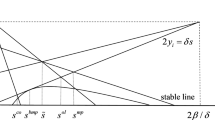Abstract
The aim of this work is to analyze lexicographic equilibrium problems on a topological Hausdorff vector space X, and their relationship with some other vector equilibrium problems. Existence results for the tangled lexicographic problem are proved via the study of a related sequential problem. This approach was already followed by the same authors in the case of variational inequalities.
Similar content being viewed by others
References
Blum E., Oettli W.: From optimization and variational inequalities to equilibrium problem. Math. Stud. 63, 123–145 (1994)
Konnov I.V.: On lexicographic vector equilibrium problems. J. Optmi. Theory Appl. 118, 681–688 (2003)
Bianchi M., Konnov I., Pini R.: Lexicographic variational inequalities with applications. Optimization 56, 355–367 (2007)
Hadjisavvas, N., Khatibzadeh, H.: Maximal monotonicity of bifunctions. Optimization (forthcoming)
Daniilidis A., Hadjisavvas N.: On the subdifferentials of quasiconvex and pseudoconvex functions and cyclic monotonicity. J. Math. Anal. Appl. 237, 30–42 (1999)
Crouzeix J.-P., Marcotte P., Zhu D.: Conditions ensuring the applicability of cutting-plane methods for solving variational inequalities. Math. Program. 88, 521–539 (2000)
Bianchi M., Kassay G., Pini R.: Existence of equilibria via Ekeland’s principle. J. Math. Anal. Appl. 305, 502–512 (2005)
Lin L.-J., Du W.-S.: On maximal element theorems, variants of Ekeland’s variational principle and their applications. Nonlinear Anal. 68, 1246–1262 (2008)
Djafari Rouhani B., Tarafdar E., Watson P.J.: Existence of solutions to some equilibrium problems. J. Optim. Appl. 126, 97–107 (2005)
Konnov I.V., Ali M.S.S.: Descent methods for monotone equilibrium problems in Banach spaces. J. Comput. Appl. Math. 188, 165–179 (2006)
Chadli O., Chbani Z., Riahi H.: Equilibrium problems with generalized monotone bifunctions and applications to variational inequalities. J. Optim. Theory Appl. 105, 299–323 (2000)
Bianchi M., Pini R.: Coercivity conditions for equilibrium problems. J. Optim. Theory Appl. 120, 79–92 (2005)
Konnov I.V.: Regularization method for nonmonotone equilibrium problems. J. Nonlinear Convex Anal. 10, 93–101 (2009)
Brézis H., Nirenberg L., Stampacchia G.: A remark on Ky Fan’s minimax principle. Bolletino della Unione Matematica Italiana 6, 293–300 (1972)
Bianchi M., Pini R.: A note on equilibrium problems with properly quasimonotone bifunctions. J. Global Optim. 20, 67–76 (2001)
Avriel M., Diewert W.E., Schaible S., Zang I.: Generalized Concavity. Plenum Press, New York and London (1988)
Tversky A.: Intransitivity of preferences. Psychol. Rev. 76, 31–48 (1969)
Shafer W.: The non-transitive consumer. Econometrica 42, 913–919 (1974)
Author information
Authors and Affiliations
Corresponding author
Additional information
In this work, the second author was supported in part by RFBR–NNSF Grant No. 07-01-92101.
Rights and permissions
About this article
Cite this article
Bianchi, M., Konnov, I.V. & Pini, R. Lexicographic and sequential equilibrium problems. J Glob Optim 46, 551–560 (2010). https://doi.org/10.1007/s10898-009-9439-6
Received:
Accepted:
Published:
Issue Date:
DOI: https://doi.org/10.1007/s10898-009-9439-6




